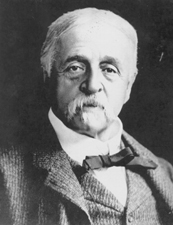Thomas W. Palmer
| Thomas Witherell Palmer | |
|---|---|
 |
|
|
United States Senator from Michigan |
|
|
In office March 4, 1883 – March 4, 1889 |
|
| Preceded by | Thomas W. Ferry |
| Succeeded by | James McMillan |
| Personal details | |
| Born |
January 25, 1830 Detroit, Michigan, USA |
| Died | June 1, 1913 (aged 83) Detroit, Michigan |
| Political party | Republican |
| Spouse(s) | Lizzie Pitts Merrill Palmer |
| Alma mater | University of Michigan |
| Profession | Politician |
| Religion | Unitarian |
Thomas Witherell Palmer (January 25, 1830 – June 1, 1913) was a U.S. Senator from the state of Michigan. He is considered to be one of the most significant figures in the history of Detroit, Michigan.
Palmer was born in Detroit, where his mother was the daughter of the third Michigan Territorial Judge James Witherell, while his father was a New England merchant who had settled in the city following the War of 1812. Palmer attended the public schools, Thompson’s Academy in Palmer (now St. Clair), and studied one year at the University of Michigan in Ann Arbor. He traveled to Spain and South America and then entered the real estate business in Detroit in 1853 and then engaged in lumbering and agricultural pursuits with his future father-in-law, Charles Merrill, beginning in 1855. He served on the first board of directors and as the first president for the Michigan Society for the Prevention of Cruelty to Animals (now known as the Michigan Humane Society).
He served on the Board of Estimates of Detroit in 1873 and was a member of the Michigan State Senate 1879–1880. He was elected as a Republican to the United States Senate and served from March 4, 1883 to March 4, 1889. He was not a candidate for reelection. He was chairman of the Committee on Fisheries in the Forty-ninth Congress, and the Committee on Agriculture and Forestry in the Fiftieth Congress. While in the Senate, he became known as an advocate for the women's suffrage movement, immigration restrictions, and homesteader rights. He is credited with coining a phrase widely adopted by latter-day reformers, Equal rights for all, special privileges to none. On February 6, 1885, he delivered a noted speech arguing in favor of an amendment to the U.S. Constitution granting women's suffrage.
...
Wikipedia
